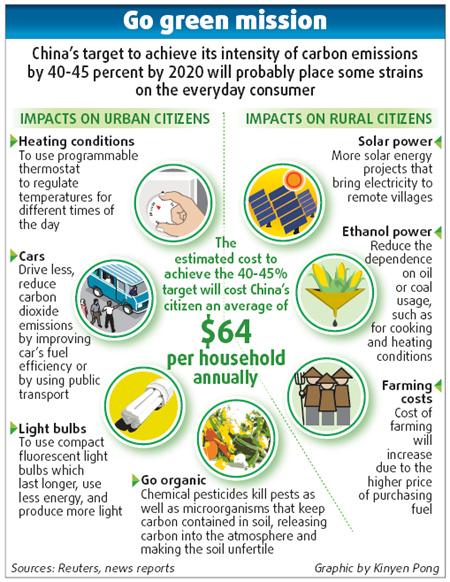Harrison Wang, a 28-year-old audio engineer, has been thinking about putting his compact car in storage ever since his fuel bill started rising as a result of the government's deregulation of the oil price.
And now, after the Chinese government told the world it will cut carbon intensity by 2020 by a hefty 40 to 45 percent, he is expecting gasoline for his 0.8- liter car will cost a lot more than the 400 yuan ($59) he currently spends each month.
"I'm already driving a low-emission car but, if the cost of fuel continues to rise, I might have to stop driving," he said.
His concerns are not unfounded.

Researchers have been busy calculating what China's carbon emissions target announced last week will mean for the average family.
A report from Renmin University of China said that reaching the carbon target will cost China an additional investment of $30 billion each year during the next decade in addition to the cost of continuing with the initiatives aimed at improving energy efficiency.
If the cost of the carbon cut is passed on to the public, each Chinese household will have to spend 440 yuan ($64) more each year, reported 21st China Business Herald.
Jiang Kejun, a researcher with the Energy Research Institute under the National Development and Reform Commission, said people should expect to pay more for energy and other products derived from fossil fuels.
"Energy-related industries will have to face incremental costs to improve their carbon efficiency, but ultimately, such incremental costs will have to be shouldered by the consumers," he said.
For instance, carbon tax, one of the market mechanisms that China is considering adopting, will raise the current energy price from fossil fuel sources, including gasoline, electricity, coal and natural gas.
"If the carbon tax is levied at 100 yuan per ton of carbon emission, the price of petrol would go up by 300 yuan per ton, about a 5 percent increase," Jiang said. "But the impact on the price of electricity will be even more pronounced."
Jiang said the Ministry of Environmental Protection and the Ministry of Finance were currently discussing a carbon tax scheme.
The scheme reportedly calls for a starting carbon tax of around 10 to 20 yuan per ton of carbon emission.
Huang Xiaobai, an office worker in Shanghai, reacted to the prospect of rising fuel costs by saying she too might give up her car.
"I am willing to pay the increased prices if that can really reduce carbon emissions and slow down global warming, but I'd like to know how much more we need to pay," Huang said.
Zhang Jianyu, the Beijing head of the US-based Environmental Defense Fund, said the target and the resulting higher prices will motivate the public to shift to a low-carbon lifestyle. Zhang said more people will use public transportation and energy-efficient appliances as a result.
"People will also feel the benefit themselves from changing their lifestyles," Zhang said.
Pan Jiahua, climate policy expert at the Chinese Academy of Social Sciences, said the emissions cut goal will be very difficult to achieve because many of the easier steps to reduce emissions have already been taken in a bid to realize the 20 percent improvement in energy efficiency targeted between 2006 and 2010.
"Achieving it will require a shift away from old power plants for our energy and the offering of financial subsidies for energy-saving appliances, clean vehicles and so on," he said.
Barbara Finamore, the China program director with the Natural Resources Defense Council, a US environmental organization, said earlier that Beijing should be credited for efforts already underway and not penalized for taking early action.






